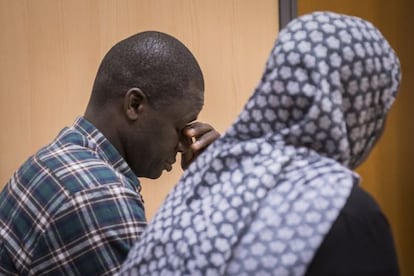Gambian parents each given 12 years' jail in genital mutilation case
Barcelona court finds that the extirpation was carried out in Spain


It is not clear who mutilated the daughters of Binta Sankano and Sekou Tutay. The exact date is also unknown, as is the location. But the Barcelona provincial High Court is in no doubt that when the girls, aged 11 and 6 at the time, went to a gynecologist for a check-up on January 20, 2011 their clitorises had been removed.
Their parents told the court during their trial that between the time of a previous appointment in 2010, when no abnormality was noted and 2011, when the extirpation was detected, they had not traveled to their country of origin, Gambia, nor had they left Spain at any point. On the basis of this testimony and other witness statements, the court found Sankano and Tutay guilty of the crime of female genital mutilation and sentenced them both to 12 years in prison, six years for each daughter.
The case is one of the first of its kind to go to trial in Spain, says an expert from the Catalonia regional government. "There is no evidence that these types of interventions are carried out clandestinely in Spain; normally the parents travel to their countries of origin to have them performed," noted the court ruling.
Medical staff said no scars were visible, meaning the crime was not recent
But the girls' mother "was adamant that she had not traveled to Gambia during the period in question, and that she had remained in Spain with her daughters," the court found. She denied genital mutilation but was "evasive and reluctant" in her answers and claimed she "did not know that the practice was illegal and constituted a crime." Binta also said she was illiterate and did not know if she had been submitted to so-called "female circumcision" in her childhood.
But the authorities in Vilanova I la Geltrú in Catalonia, where the family lives, visited Binta in 2008 to explain Spanish laws on genital mutilation. "The defendant agreed not to carry out the practice on her children," read the sentence. But in that interview she was "angry" and later "said she was in favor of genital mutilation."
Sekou Tutay also denied any involvement during the trial. He said he was against the practice and that the procedure must have been carried out in Gambia in 2007, when the children lived there for two years, an argument which was disproved by the 2010 check-up. The medical staff present at that appointment also testified to that effect and noted that the children and Binta were "visibly reluctant" to undergo the examination. "They didn't seem to understand why they were there," said the gynecologist.
At the next examination, one year later, the medical staff discovered that the minors' clitorises had been removed and that they did not present any scars, showing that the mutilation had not been carried out recently. But the court said the date was irrelevant. The fact that the parents themselves said they had not left Spain in the interim gave the court jurisdiction over the offense, it said.
The magistrates also did not accept that the parents were unaware that the practice is a crime in Spain due to their long residency in the country. Grounds for exception on the basis that the parents had promised to provide reconstructive surgery were also thrown out. Furthermore, neither progenitor had reported the fact that the children had been mutilated.
Tu suscripción se está usando en otro dispositivo
¿Quieres añadir otro usuario a tu suscripción?
Si continúas leyendo en este dispositivo, no se podrá leer en el otro.
FlechaTu suscripción se está usando en otro dispositivo y solo puedes acceder a EL PAÍS desde un dispositivo a la vez.
Si quieres compartir tu cuenta, cambia tu suscripción a la modalidad Premium, así podrás añadir otro usuario. Cada uno accederá con su propia cuenta de email, lo que os permitirá personalizar vuestra experiencia en EL PAÍS.
¿Tienes una suscripción de empresa? Accede aquí para contratar más cuentas.
En el caso de no saber quién está usando tu cuenta, te recomendamos cambiar tu contraseña aquí.
Si decides continuar compartiendo tu cuenta, este mensaje se mostrará en tu dispositivo y en el de la otra persona que está usando tu cuenta de forma indefinida, afectando a tu experiencia de lectura. Puedes consultar aquí los términos y condiciones de la suscripción digital.








































